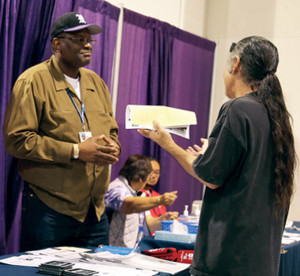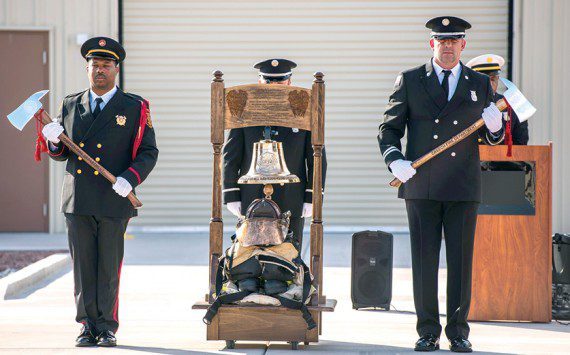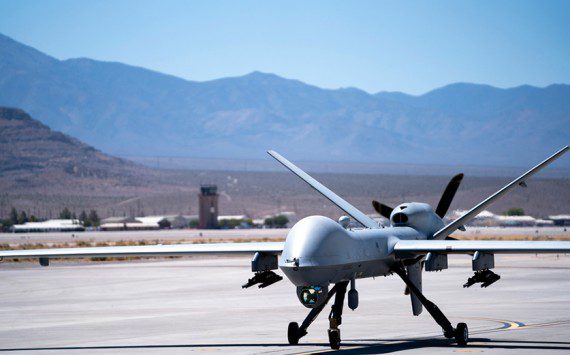A Homeless PACT Team outreach member talks with a veteran during the 25th annual Project Homeless Connect in Las Vegas Nov. 14.
NORTH LAS VEGAS, Nev. — The VA Southern Nevada Healthcare System continued its efforts to support the local homeless community by participating in the 25th annual Project Homeless Connect in Las Vegas Nov. 14.
Offering services ranging from health care and legal services to employment opportunities and benefits, the event brought dozens of volunteers and more than 150 non-profit organizations to the Cashman Center to help those in need.
According to a 2017 Southern Nevada Homeless Census and Survey, nearly 25,000 residents will experience homelessness this year. And while Southern Nevada has reached Functional Zero for veterans, which means resources are available to provide shelter for veterans experiencing homelessness, Las Vegas remains home to the third largest population of homeless veterans in the nation.
The VA Southern Nevada Healthcare, along with the Reno Regional VA Benefits Office and Nevada Department of Veterans Services sent staff to enroll new veterans, provide flu shots, social work counseling, dietary consultation and assistance with housing, benefits and employment.
One of the most effective weapons in the fight against homelessness, however, is the HPACT.
The VA Homeless Primary Aligned Care Team is a community-based outreach clinic that specializes in homeless veteran health care.
The Northeast Primary Care Clinic is the operating base for this team, and it’s collocated with the VASNHS’ Community Resource and Referral Center, as most of the homeless population in Las Vegas reside nearby.
Egosha Odobo, Nurse Practitioner for the HPACT, as well as the only Primary Care Provider for the team, says that they are able to offer a one-stop-shop for the specific care required for homeless veterans.
“What we provide, it’s not just medical alone; we give them shelter,” said Odobo. “We give them three square meals a day. And then they have a place to shower, and a place to wash their clothes, while their medical needs are covered.”
In additional to the normal challenges involved with medical care, there are several unique aspects of dealing with homeless veterans.
Substance abuse is often a concern, says Odobo, but the biggest issue is usually logistical. “They have no way of being contacted. They have no phones, so getting them back is not easy. We have to involve a lot of people within the community to get them back for urgent care or follow-ups for lab results.”
Because most homeless veterans lack access to phones or internet, the HPACT has had to be flexible with their scheduling. “Every veteran that comes in for medical care, they are seen the same day,” explained Odobo. “In between the scheduled veterans, if we have someone who walks in, they will be seen. Nobody is being turned away.”
The unique mission of the HPACT requires certain personality traits, according to Joseph Yip, a registered nurse at the Northeast clinic.
“It’s just about having that openness to work with them where they’re at, and not judge them. It’s easy start with a lot biases, a lot of preconceptions about working with homeless veterans. I know I did when I started, but the reality is that they are just everyday regular people, some of them just went through difficult situations in life.”
“There are a lot of challenges; that’s why we need people who have a heart for the homeless Veterans,” added Odobo. “And the most rewarding thing is when you see someone who had no hope, and now has a lot of hope and a bright future.”













